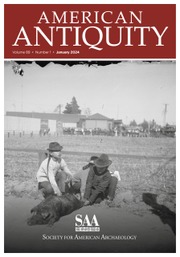Crossref Citations
This article has been cited by the following publications. This list is generated based on data provided by
Crossref.
Gallivan, Martin
Moretti-Langholtz, Danielle
and
Woodard, Buck
2011.
Collaborative Archaeology and Strategic Essentialism: Native Empowerment in Tidewater Virginia.
Historical Archaeology,
Vol. 45,
Issue. 1,
p.
10.
Murray, Tim
2011.
Archaeologists and Indigenous People: A Maturing Relationship?.
Annual Review of Anthropology,
Vol. 40,
Issue. 1,
p.
363.
Dixon, Kelly J.
2014.
Historical Archaeologies of the American West.
Journal of Archaeological Research,
Vol. 22,
Issue. 3,
p.
177.
Äikäs, Tiina
and
Spangen, Marte
2016.
New Users and Changing Traditions—(Re)Defining Sami Offering Sites.
European Journal of Archaeology,
Vol. 19,
Issue. 1,
p.
95.
Colwell, Chip
2016.
Collaborative Archaeologies and Descendant Communities.
Annual Review of Anthropology,
Vol. 45,
Issue. 1,
p.
113.
Cipolla, Craig N.
and
Quinn, James
2016.
Field School Archaeology the Mohegan Way: Reflections on Twenty Years of Community-Based Research and Teaching.
Journal of Community Archaeology & Heritage,
Vol. 3,
Issue. 2,
p.
118.
Phillippi, Bradley D.
and
Sheades, Eiryn
2019.
Prospects and Pitfalls: Comments on Action Research at Sites of Mixed Heritage.
Journal of African Diaspora Archaeology and Heritage,
Vol. 8,
Issue. 1-2,
p.
147.
Wylie, Alison
2019.
Crossing a Threshold: Collaborative Archaeology in Global Dialogue.
Archaeologies,
Vol. 15,
Issue. 3,
p.
570.
Britt, Kelly M.
2019.
Collaborating on the Federal Level: Moving Beyond Mandated Consultation in the Section 106 Process.
Archaeologies,
Vol. 15,
Issue. 3,
p.
496.
Martinez, Desireé Reneé
2020.
Encyclopedia of Global Archaeology.
p.
5642.
Hoffmann, Tanja
2020.
Archaeologies of the Heart.
p.
59.
Lanoë, François B.
Zedeño, M. Nieves
Soza, Danielle R.
and
Jansson, Anna M.
2020.
McKean in the Northern Rocky Mountain Front: Economic landscape and ethnogenesis.
Plains Anthropologist,
Vol. 65,
Issue. 255,
p.
227.
Wylie, Alison
2022.
Humanizing Science and Philosophy of Science: George Sarton, Contextualist Philosophies of Science, and the Indigenous/Science Project.
Canadian Journal of Philosophy,
Vol. 52,
Issue. 3,
p.
256.
Verdesio, Gustavo
2022.
Rethinking Indigenous and Collaborative Archaeologies.
Interventions,
Vol. 24,
Issue. 2,
p.
208.
Ojala, Carl-Gösta
2022.
Critical Studies of the Arctic.
p.
99.
Hampson, Jamie
and
Challis, Sam
2024.
Deep-Time Images in the Age of Globalization.
p.
275.
Apodaca, Alec
Sanchez, Gabriel M.
Sigona, Alexii
Grone, Michael
Lopez, Valentin
and
Lightfoot, Kent G.
2024.
Indigenous eco-archaeology: past, present, and future of environmental stewardship in central coastal California.
Frontiers in Environmental Archaeology,
Vol. 3,
Issue. ,
Glatz, Claudia
Sorotou, Aphrodite
Raheem, Kamal Rasheed
Abdullah, Hashim Hama
Mohammed-Amin, Rozhen K.
Marf, DLshad A.
Abdullatif, Nawzad
Amin, Amanj
Calderbank, Daniel
Laugier, Elise Jakoby
Hamdan, Sarwat
Ali, Mohammed
Ahmad, Ameera
Sameen, Salah Mohammed
and
Haydar, Shwkr Muhammed
2024.
Archaeology as Cultural Heritage in the Kurdistan Region of Iraq.
Current Anthropology,
Vol. 65,
Issue. S26,
p.
S55.
Tomášková, Silvia
2024.
Deep-Time Images in the Age of Globalization.
p.
233.


